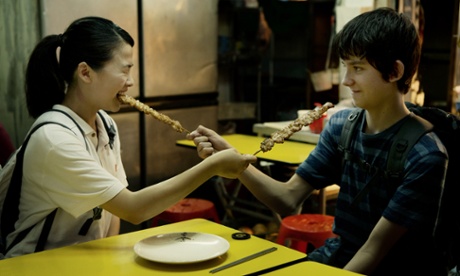We are all post-reality and post-truth now. We live as easily online as we do in meatspace. Rumour flies a million times round the world and is established as fact before the truth has even realised there’s a problem, let alone started pulling its boots on. Our elected politicians lie with impunity and thieve from the public purse without consequence. Possess actual knowledge of something and be decried as an elitist and/or establishment stooge. Possess a plausible manner and/or an array of sockpuppet accounts and become a leader of credulous men.
And yet, still, the sheer gall and effrontery of the genuine, large-scale grifter, the person who builds a fantasy land for themselves and forces everyone to live in it remains compelling. We have had a slew of recent dramas and documentaries on the subject, and now here’s another tale of a real-life grifter par excellence before which to sit and boggle. Devil’s Advocate: The Mostly True Story of Giovanni Di Stefano (Sky Documentaries) is a three-part examination of the rise and fall of Giovanni di Stefano, AKA John di Stefano, AKA Mr Murder, AKA the eponymous advocate. He was the lawyer, who made his name securing the notorious gangster and fraudster John “Goldfinger” Palmer an appeal against the confiscation of much of his fortune, which ended in Palmer retaining most of the money. He then went on to become famous for, as he put it, “defending the indefensible”. His list of clients read like a Who’s Who of criminality, ranging from Nicholas van Hoogstraten (finding a way to overturn the property tycoon’s manslaughter conviction) all the way up to Saddam Hussein and Slobodan Milošević (whom Di Stefano apparently befriended, along with the Serbian paramilitary leader, Željko “Arkan” Ražnatović, when he fled Hollywood for the then war zone in Yugoslavia to escape the consequences of a dubious purchase of MGM), via the likes of Harold Shipman, Ian Brady and various infamous others.
Except, of course, almost none of it was true. And what thin straws of truth there were fashioned into sturdy-looking bricks to build a wall of lies and obfuscation around the charismatic, endlessly quotable, media-friendly lawyer who apparently had no shame and who delighted in being an outsider to and thorn in the side of the traditional legal establishment. A few astute people along the way saw that what many dismissed as the natural arrogance of a successful lawyer was more like the grandiosity of something quite other, but the discovery that not only were half the clients he claimed no such thing but that he was not even a qualified lawyer to begin with still made you reel.
The documentary covers a lot of ground: from Di Stefano’s childhood in Petrella Tifernina in southern Italy, the family’s emigration to England when he was six, his convoluted career as a lawyer and fraudster, the painstaking seven-year investigation by the most patient, detail-oriented man in recorded history – Detective Constable Jerry Walters– and the resulting trial and its outcome. It does so in a way that is almost as convoluted as Di Stefano’s career – jumping back and forth in various timelines recounted by Walters and victims as well as the one it is supposedly following itself. Even in an era of non-linear storytelling it is too much. What we gain in an appreciation of the welter of truths, half-truths, outright lies and genuine confusion out of which Walters had to glean his evidence is largely lost in our understanding of the chronology of the case, Di Stefano’s career and quite how he did it. Without such detail, you miss out on some of the awe at the scale of his deceptions – and achievements, however twisted they were – which powers this kind of thing.
There is little analysis of what motivated Di Stefano – we get a half-hearted submission of school bullying for being an “Eyetie”, as he – or rather the actor giving voice to his words from previous interviews and footage – put it (Di Stefano did not take part in the programme), and a love of attention. But the accumulating evidence from the recent crop of examinations of the phenomenon suggests that living a “better” life is just what some people do, as naturally as the rest of us breath and pay our bills.
Walters, the still, quiet, conscientious centre of the storm is, arguably, more interesting. The detective constable spent five years turning up clues, following leads, gathering the testimonies of smaller, sadder victims of Di Stefano’s less glamorous scams, and marshalling them into a case to stop Di Stefano wreaking havoc and laying waste to ordinary lives without a backward glance. I could take a three-part documentary about good people right now, you know. I really could.











